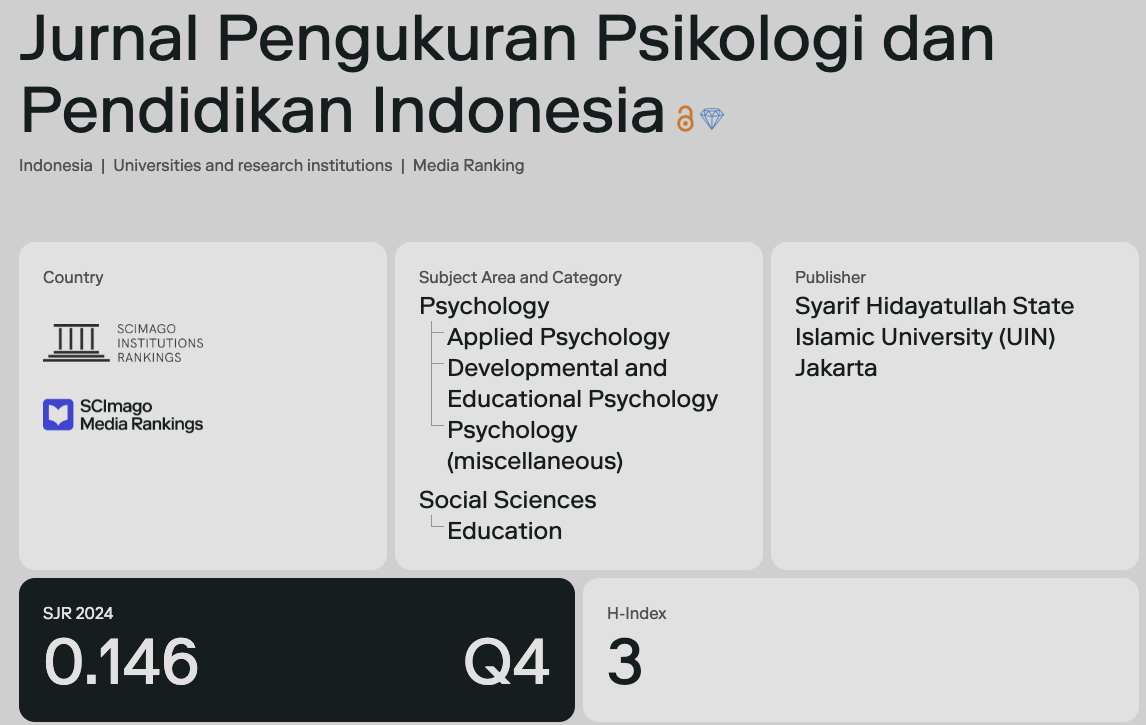Fear of Missing Out Scale Indonesian Version: An Internal Structure Analysis
DOI:
https://doi.org/10.15408/jp3i.v9i2.16283Keywords:
fear of missing out, social media, exploratory factor analysisAbstract
Fears of Missing Out (FOMO) is a form of anxiety that arises when someone uses social media. The FOMO scale has three components, namely Sense of Self/Self Esteem, Social Interaction/Extroversion, and Social Anxiety. The purpose of this study is to determine the number of dimensions that precisely measure the FOMO level of social media users. Factor analysis testing conducted on the FOMO Scale is exploratory factor analysis. Exploratory factor analysis is performed to determine the number of components that are most appropriate on the FOMO scale. This study involved 211 respondents who filled out the survey through Google Form. A total of 5 respondents were involved in the process of testing the Indonesian version of the FOMO scale measuring instrument and 2 respondents did not complete the demographic data. Therefore, 204 eligible respondents were used in the analysis process, namely undergraduate students and the frequency of social media checking in a day with an age range of 18-28 iyears. The results of the analysis show that the items on the Fear of Missing Out Scale are grouped into 3 components according to each component definitions.References
Abel, J. P., Buff, C. L., & Burr, S. A. (2016). Social media and the fear of missing out: Scale development and assessment. Journal of Business & Economics Research, 14(1), 33-44.
Andreassen, C. S. (2015). Online social network site addiction: A comprehensive review. Current Addiction Reports(2), 175-184.
Anwar, Z., & Fury, E. D. (2020). The Fear of Missing Out and Usage Intensity of Social Media. Advances in Social Science, Education and Humanities Research: 5th ASEAN Conference on Psychology, Counselling, and Humanities (ACPCH 2019), 395, 183-187.
Apaolaza, V., Hartmann, P., D’Souza, C., & Gilsanz, A. (2019). Mindfulness, compulsive mobile social media use and derived stress: The mediating roles of self-esteem and social anxiety. Cyberpsychology, Behavior, and Social Networking, 22(6), 388-396. doi:10.1089/cyber.2018.0681
Azwar, S. (2008). Penyusunan skala psikologi. Yogyakarta: Pustaka Belajar.
Berenson, K. R., Gyurak, A., Ayduk, O., Downey, G., Garner, M. J., Mogg, K., & et al. (2009). Rejection sensitivity and disruption of attention by social threat cues. Journal of Research on Personality, 43(6), 1064-1072. doi:10.1016/j.jrp,2009.07.007
Downey, G. &. (1996). Implications of rejection sensitivity for intimate relationships. Journal of Personality and Social Psychology, 70(6), 1327-1343.
Irel, I. R. (2017). Hubungan Sense of Self dengan Kecenderungan Perilaku Bullying. Psikodimensia, 16(1), 91–106.
Neuman, W. (2014). Social research methods: Qualitative and quantitative approaches (7th ed.). Harlow: Pearson Education.
Prasanti, D., & Indriani, S. S. (2017). Interaksi sosial anggota komunitas Let's Hijrah dalam media sosial group Line. Jurnal The Messenger, 9(2), 144-152.
Przybylski, A. K. (2013). Motivational, emotional, and behavioral correlates of fear of missing out. Computers in human behavior, 29(4), 1841–1848.
Putri, L. S., Purnama, D. H., & Idi, A. (2019). Gaya hidup mahasiswa pengidap Fear of Missing Out di kota Palembang. Jurnal Masyarakat&Budaya, 21(2), 129-148.
Sianipar, N. A., & Kaloeti, D. V. (2019). Hubungan antara regulasi diri dengan Fear of Missing Out pada mahasiswa tahun pertama fakultas psikologi Universitas Diponegoro. Jurnal Empati, 8(1), 136-143.
Soekanto, S. (2001). Sosiologi suatu pengantar . Jakarta: PT Raja Grafindo Persada.
Stein, M. B., & Stein, D. J. (2008). Social anxiety disorder. The Lancet, 371, 1115–1125.
Yong, A. G., & Pearce, S. (2013). A beginner’s guide to factor analysis: Focusing on exploratory factor analysis. Tutorials in Quantitative Methods for Psychology, 9(2), 79-94. doi:10.20982/tqmp.09.2.p079
Yuniarti, N., Sulasmini, L., Rahmadhani, E., Rohaeti, E. E., & Fitriani, N. (2018). Hubungan kemampuan komunikasi matematis dengan self-esteem siswa SMP melalui pendekatan contextual teaching and learning pada materi segi empat. Jurnal Nasional Pendidikan Matematika, 2(1), 62-72








